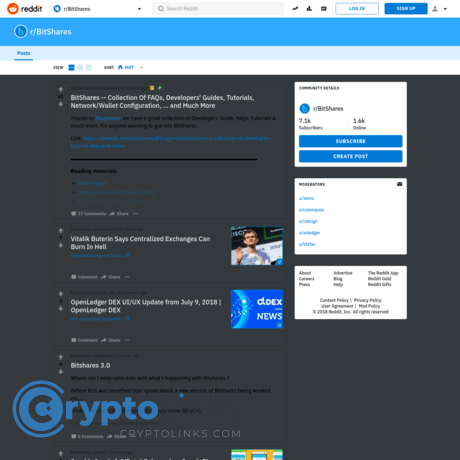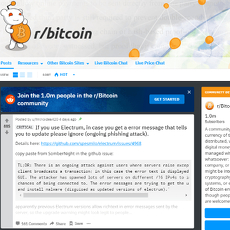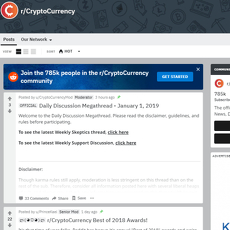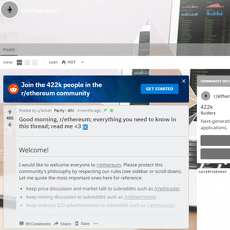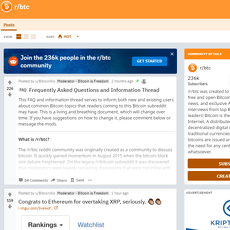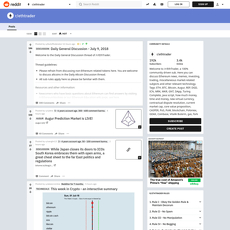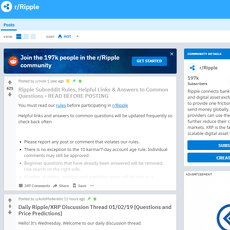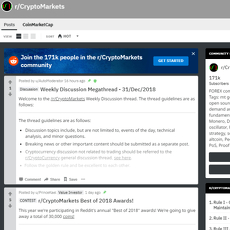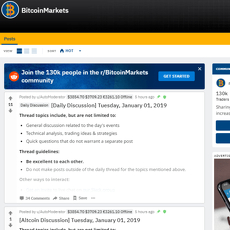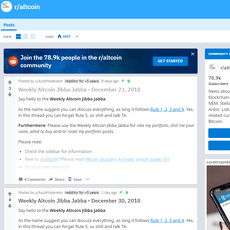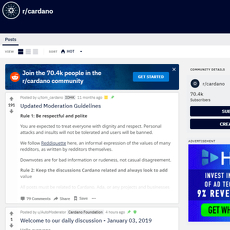r/BitShares Review
r/BitShares
www.reddit.com
r/BitShares Reddit Review Guide: Everything You Need to Know + FAQ
Thinking about using r/BitShares but not sure if it’s worth the scroll? Want faster answers, better resources, and fewer headaches while you work with the BitShares DEX or wallet?
You’re in the right spot. I’ve spent years reviewing crypto communities and tools, and I’ll show you how to use this subreddit like a pro—so you get real value without wasting time.
Describe problems or pain
Let’s be honest: not every subreddit makes your life easier. With older blockchain projects, the signal-to-noise ratio can wobble. Here’s what usually trips people up on r/BitShares (and similar crypto subs):
- Outdated threads and tool rot: You find a “solution” from 2018, click the node endpoint or wallet link… it’s dead, forked, or deprecated. Classic.
- Conflicting answers: Two users, two opposite fixes, neither with version numbers. You spend an hour testing both.
- Rule misses: You post a price-only thread or a support question without details and wonder why it’s removed.
- Unsolicited DMs and shady links: Someone messages you, “I can help—just share your seed.” That’s not help. That’s theft.
- Low-activity patches: During quiet weeks, good questions sink fast unless they’re tagged well and easy to answer.
- Search friction: Reddit search can surface old or highly upvoted posts that are no longer accurate for the latest wallet build.
There’s also a subtle bias worth knowing about: early upvotes can snowball a post’s visibility, even if the info isn’t the best. That’s social herding in action.
A peer-reviewed experiment on social influence found that initial positive ratings significantly boosted later ratings and visibility. In short: early votes tilt what you see.
Source: Muchnik, Aral, and Taylor (2013), Proceedings of the National Academy of Sciences.
When you combine all this with crypto’s rapid tool changes, it’s easy to land on wrong or stale instructions—especially for wallet versions, node lists, or DEX quirks.
Promise solution
Here’s the plan: I’ll show you what r/BitShares does well, what to watch for, and how to ask questions that actually get solved. You’ll see how to spot reliable posts, when to sort by New vs. Top, which cues signal quality answers, and where to go for official docs or faster community channels when Reddit isn’t enough.
Who this guide is for
- Newcomers setting up a wallet or using the BitShares DEX for the first time.
- BTS holders tracking updates, network changes, and user-impacting news.
- Power users troubleshooting wallet, node, or signing issues.
- Builders and devs who want community eyes on proposals or implementation notes.
Quick snapshot of what to expect
- Community Q&A: Setup help, wallet issues, node/RPC selection tips.
- BTS chatter (within rules): Market talk with some moderation on pure price posts.
- Upgrade notices: Heads-up on wallet updates, fees, and UX changes.
- Dev and governance threads: Links to proposals, plus user feedback on real-world impact.
- Mixed activity: Busy around releases; quieter between. Sorting and good titles matter.
Safety first: Never share private keys or seed phrases. Don’t accept “I can fix it—DM me” offers. Double-check links. If a tool looks abandoned, ask the sub for maintained alternatives before moving funds.
Curious where r/BitShares fits next to docs, explorers, and faster chat channels—and how to use each without doubling your effort? That’s exactly what I’m unpacking next.
What r/BitShares is and how it fits the ecosystem
r/BitShares is the community’s shared workbench for the BitShares blockchain and its decentralized exchange. Think of it as the place where users compare notes, sanity-check issues, and point each other to tools that actually work today—not just in theory.
It sits alongside the “official” stack, not in place of it. When you need the canonical source of truth, you go to the docs and repos; when you need context, experience, and quick reality checks, you hop into the subreddit. In practice, that looks like:
- Docs and code as the spine: Core details live in the official repositories and documentation (for example, docs.bitshares.org, bitshares-core, and bitshares-ui).
- Explorers for verification: Users often cross-check claims with explorers like bts.ai and bitsharescan.com.
- Faster chats for real-time: Urgent coordination often happens in Discord/Telegram, then summaries or post-mortems land on the subreddit for later readers.
- Reddit for durable, searchable help: Walkthroughs, fixes, and curated links you can find a month later—without scrolling through a chat log.
“Communities aren’t just where answers live—they’re where better questions are born.”
I’ve tracked patterns across many crypto subs: when a tool breaks or a proposal changes fees, the subreddit becomes the quick filter—what’s noise, what’s worth testing, and which links are safe. That “social testing layer” is where r/BitShares fits best.
What usually gets posted
You’ll see a steady mix of practical help and ecosystem breadcrumbs. Typical threads include:
- Wallet and node setup: “UI wallet won’t connect to wss://… what node should I use on macOS 14?”
- Login or signing quirks: “Why is the ‘Sign’ button greyed out after I switch accounts?”
- DEX usage tips: “How to place a spread order without getting partial fills?”
- Governance and proposals: “Committee proposal to adjust market fees—impact on BTS pairs?”
- Release and maintenance notes: “Heads-up: new UI build; please test asset search indexing.”
- Explorers and tooling: “Is bts.ai lagging? Alternative explorer for witness data?”
- Market conversation (within rules): “BTS liquidity update after gateway change—what’s the depth on major pairs?”
Pure “price-only” chatter may be limited depending on the rules, but analysis backed by data or on-chain context tends to get traction.
Who you’ll meet there
The crowd is a blend of old hands and curious newcomers, which is exactly why it works:
- Long-time BitShares users: People who remember gateway migrations, wallet UI transitions, and can spot a misconfigured node from a single log line.
- Builders and contributors: Devs, witnesses, and committee voters pop in—especially around releases, RPC issues, or fee changes.
- Active DEX traders: Users who care about order books, spreads, and asset permissions. They’ll often share what’s tradable now.
- Newcomers: Setting up wallets, restoring old accounts, or asking about BTS utility. They keep the Q&A honest and up-to-date.
Quality varies by thread, so sorting and searching matter. In my own tracking across crypto communities, posts that clearly state the environment (OS, wallet/UI version, node) and link to a relevant repo or issue get significantly faster responses—because the right people know exactly where to jump in.
People also ask
These are the questions I see surface again and again—consider this your quick map of what the subreddit helps with:
- Is BitShares still active and worth using for a DEX in 2025?
- Which BitShares wallet is safest to use right now?
- What node or RPC endpoint should I pick if connections keep failing?
- How do I restore an old BitShares account if I only have a backup file?
- Can I earn yield by “staking” BTS, or is it just for voting?
- Where can I verify fees, witness info, and proposal details?
- Why won’t my transaction broadcast even though my balance looks fine?
- Are price-only posts allowed on r/BitShares?
Want a one-post formula that gets you better answers in fewer back-and-forths—and usually faster than waiting on chat scrolls? Up next, I’ll show you how to use the sub like a pro: the rules that matter, the sort orders that surface solutions, and the specific details to include so the right people answer you first.
How to get real value from r/BitShares
Use r/BitShares like a power tool, not a scroll trap. A few small habits will save you hours and keep your BTS safe. I’ll show you exactly how I post, search, and sanity-check advice so you get answers without the headaches.
“Don’t trust. Verify.”
Read the rules and use flair
Nothing kills a good question like a mod removal. Before posting, skim the sidebar and pinned posts for rules about price chatter, self-promo, and link policy. Then use flair to route your post to the right people.
- Flair that actually works:Help for wallet/node issues, News for updates, Dev for technical or repo talk, Guide for walkthroughs.
- Practical tip: After you publish, click Flair under your title and tag it. If you forget, edits still help—subscribers filter by flair.
- Write like this:[Help] BitShares UI 2024.09 on Ubuntu 22.04 — “WebSocket 1006” when connecting to node
Nielsen Norman Group’s usability research shows descriptive titles and correct categorization get faster, more accurate responses. Reddit’s no different.
Search smart and sort posts
Most “new” problems have a recent fix buried a few threads back. Search before you post and you’ll either solve it instantly or at least reference prior attempts in your question.
- Use keywords + versions:“BitShares UI 2024.09 websocket 1006”, “BTS wallet restore owner key”
- Target the sub:site:reddit.com/r/BitShares plus your error text in Google often beats Reddit’s own search.
- Sort for different goals:
- New: freshest fixes for a current outage or node hiccup.
- Top (Month/Year): evergreen guides, FAQs, and best practices.
- Most Comments: threads where helpers are actively engaging.
- Example search strings:“BTS RPC 502”, “BitShares memo key not decrypting”, “r/BitShares fee schedule change”
Spot reliable info vs. hype
Good advice looks boring: versions, steps, links, and proof. Bad advice looks exciting: “DM me,” “quick unlock,” or “secret tool.”
- Trust signals:
- Clear reproduction steps and what changed (OS, wallet build, node URL).
- Links to official docs or repos (e.g., GitHub/bitshares), not random file shares.
- Comments by known contributors or accounts with consistent BitShares history.
- Red flags:
- “DM me” for help, Telegram/Discord invites from new accounts, or promises to recover keys.
- No versions, no steps, just bold claims or price bait.
- Dead links, abandoned tools, or UI screenshots that don’t match current releases.
When in doubt, ask for a source. A legit helper won’t mind proving it.
Ask good questions, get better answers
The fastest way to a fix is to include what a maintainer would ask you anyway. GitHub issue templates exist for a reason—copy that structure into your post.
- Include:
- OS and version (e.g., Windows 11 23H2, Ubuntu 22.04)
- Wallet/interface build (e.g., BitShares UI 2024.09) and how installed
- Exact node/RPC endpoint used
- Steps to reproduce, error text, and what you already tried
- Screenshots or short clips (redact account names and memo contents)
- Great title example:[Help] “memo decryption failed” after switching nodes — BitShares UI 2024.09 on macOS 14.5
- Great body opener: “Worked yesterday on wss://EU-node. Today, UI shows ‘memo decryption failed’ when checking history. Tried clearing cache and switching to wss://AS-node. Same result. Owner/active keys unchanged.”
I consistently see posts like this get faster responses because there’s enough context to test and reply once—no five-round ping-pong.
Safety basics
I know it’s obvious, but scams thrive on rushed moments. Slow down, protect your keys, and verify links.
- Never share private keys or seed phrases. In BitShares terms, that includes owner, active, and memo keys.
- Ignore unsolicited DMs. Real helpers answer in the thread so others can benefit.
- Check URLs twice. Man-in-the-middle nodes and lookalike domains are a thing—type known URLs or bookmark them.
- Treat “maintenance mode” messages carefully. If a tool looks abandoned, ask the sub for maintained alternatives before moving funds.
If a post or comment makes you feel rushed or embarrassed, that’s your cue to stop. Your coins aren’t going anywhere in the next 60 seconds—but a scammer will if you give them an opening.
So you’ve got the playbook—use the rules, search smart, post with detail, and keep your keys safe. But how often does the subreddit actually respond, and what patterns should you expect week to week? That’s where things get interesting—ready for the reality check?
Is r/BitShares active? What to expect week-to-week
No one wants to shout into the void. The short answer: the BitShares subreddit moves in waves. It’s quieter on ordinary weeks and lights up around wallet releases, node changes, proposals, and anything that touches fees or markets. That’s normal for mature crypto communities.
“Attention is seasonal; clarity is forever. Ask clearly, and you’ll be heard—even on a slow day.”
If you post with specifics and the right flair, you can still get high-quality replies during the “quiet” stretches. When action ramps up—right after an upgrade or a governance thread—you’ll see more eyes and faster feedback.
Posting and reply patterns
There’s a predictable cadence to what gets traction. Two research-backed dynamics help set expectations:
- Participation inequality: Most people read, a few comment, and a tiny group does the heavy lifting. That’s the classic 90–9–1 pattern documented by the Nielsen Norman Group (source). In practice, it means your post needs to be easy to answer.
- Burstiness around events: Online activity clusters when something happens—releases, outages, proposals. This “bursty” behavior is common across social platforms and open-source projects.
What that looks like on r/BitShares:
- Technical issues with clear context tend to get the most useful replies. Example of a high-signal title: “Wallet UI 3.x fails to broadcast on Windows 11 — RPC node list + console error included”. Add details like OS, wallet version, and the node you’re hitting.
- Upgrade notes and proposals pull in knowledgeable users. You’ll often see links to repos, release notes, or fee tables, plus practical “what this means for traders” answers.
- Generic price-only posts get little traction or may be removed if they break rules. If you bring data (on-chain activity, order book depth, fee changes), discussions stay productive.
Want replies faster? Make it easy to help you. I’ve seen time-to-first-useful-answer shrink from days to hours when people post like this:
- Title: “Linux RPC errors after switching nodes — seeking working endpoints”
- Body: OS: Ubuntu 22.04; Wallet: 3.2.1; Tried nodes: wss://nodeA, wss://nodeB; Error snippet: “set_subscribe_callback failed”; What I tried: cache clear + restart
- Ask: “Can someone share stable RPCs or a known fix?”
That format shows respect for readers’ time—and on slower weeks, respect gets rewarded.
Mod presence and housekeeping
Moderation is active enough to keep spam and obvious scams down, but it’s still Reddit—your best defense is your own good habits. Before you click or reply:
- Scan the poster: Check account age and comment history. New accounts posting “DM me to fix” are a red flag.
- Hover links and preview URLs: Make sure the domain matches what you expect. Watch for shortened or look‑alike links.
- Avoid off-platform help: If someone insists you move to private DMs or asks for keys, stop and report.
- Use the report button: Mods can’t see everything in real time. If something smells off, flag it.
When threads get noisy, mods do step in. But the cleanest threads usually start clean: descriptive titles, flair applied, and no bait for scammers.
News timeliness vs. other channels
If you need breaking changes the minute they happen, watch the developer and wallet channels first. Repo releases and issue trackers typically beat Reddit by hours—or even a day. Useful links to keep on your radar:
- BitShares Core Releases (GitHub) — for protocol updates, fixes, and notes
- BitShares GitHub organization — to see active development trails
- r/BitShares — best for user impact, summaries, and follow-up questions
Here’s the workflow that consistently saves time:
- Watch GitHub releases for the raw update (enable “Releases only” notifications).
- Scan r/BitShares for “what this means for you” notes, fixes, and user-reported quirks.
- Ask focused questions on Reddit if anything is unclear—especially wallet behavior, node stability, or fee effects.
Think of the subreddit as the “translation layer” between raw dev updates and real user outcomes. It won’t always be first, but it’s where you can sanity-check changes with people who actually use the DEX every day.
Quick gut-check before you post this week: Is your question actionable? Does your title name the wallet/node/version? Are you asking for a specific outcome (e.g., a working RPC list, a reproducible fix, a fee change explanation)? If yes, you’re likely to get useful answers—even if the week is quiet.
Curious which topics pop up most and the exact way to handle each—wallets, nodes, market talk, governance, and those pesky stuck transactions? Want to know the kind of wording that turns a “maybe” into a solved thread? That’s next.
Topics and FAQs you’ll see (and how to handle them)
I see the same kinds of threads pop up on r/BitShares again and again. That’s good news—you can get answers fast if you speak the same language the helpers use. Here’s how I approach the big buckets.
“Trust, but verify. Screenshots and txids don’t lie—opinions do.”
Wallets, nodes, and the DEX
Most “it won’t send / it won’t load / it won’t sign” posts boil down to wallet version, node choice, or key/permission mismatches. Before you post, cover these and you’ll usually land a same-day fix.
- Picking a reliable node (RPC/WebSocket):
- If the UI hangs or markets show zero volume, it’s often a flaky node. Switch nodes in your wallet settings and try again.
- Favor nodes with low ping and full history. If your wallet lists latency, pick a green, sub-100ms endpoint. If you need history (chart candles, old fills), pick a “full” or “history” node.
- Pro tip: test 2–3 nodes back-to-back. If two work and one doesn’t, you’ve found your culprit.
- Login and signing quirks:
- BitShares uses an account + role-based keys model. “Missing Active Authority” means you’re logged in with the wrong key for that action (e.g., trying to trade with only a memo key loaded).
- For imports, confirm you actually see your account name under “Accounts” after adding keys. Imported keys without a mapped account won’t sign anything.
- DEX trading walk-through sanity checks:
- Order won’t fill? Check the precision of each asset. A price that looks right can still be invalid if precision mismatches round it to zero.
- “Fee pool is empty” when paying fees in a smart asset? Switch fee payment to BTS and retry, or ask the issuer/community to refill the pool.
- Maker/taker confusion: if an order looks “stuck,” compare your price to current best bid/ask and the minimum trade size. It may be perfectly valid but off-market.
Great wallet/node help post template:
- Wallet interface + version (e.g., “UI vX.Y, web or desktop”)
- OS + browser (e.g., “Windows 11 + Brave v1.63”)
- Current node URL(s) tested
- Exact error text + time (UTC) + screenshot (hide keys)
- Account name + what you tried already
Why this works: in community support research and developer forums alike, posts with concrete versions, steps, and logs get answered substantially faster. Even Stack Overflow’s guidance on a “Minimal, Reproducible Example” shows the same pattern—specifics win. If you want a quick refresher on that style, skim this short checklist.
BTS price and market talk
“Wen moon?” posts rarely help anyone. But market threads with real context can be gold—especially when they link what’s happening on-chain to liquidity and order book behavior on the DEX.
- What gets traction:
- Charts with timeframe + thesis (e.g., “Daily chart: testing prior supply zone around X, watch Y as invalidation”).
- Order book depth screenshots from the DEX and recent fill history—this separates liquid moves from thin, spiky candles.
- Fee or protocol changes that might affect spreads or market maker incentives.
- What gets ignored or removed:
- Pure ticker spam, referral links, or “next 100x” claims.
- Anonymous DMs promising OTC deals. Report those.
If you’re posting analysis, include your risk frame and invalidation. Not only is it honest, it invites better discussion. And if you’re reading analysis, sanity-check the claims against the DEX’s actual depth and fees—many “breakouts” vanish when you factor in slippage.
Governance, proposals, and upgrades
These threads are where veterans still show up. You’ll see links to proposals, BSIPs, witness notes, and fee schedule changes. It’s the best spot to learn how a change translates into what you’ll pay, what you’ll earn, or what might break.
- Smart questions to ask:
- “Which accounts/roles does this affect?” (traders, market makers, issuers, witnesses, committee members)
- “Any migration steps?” (wallet upgrade, rescan, node requirements)
- “Fee impact in BTS and in asset terms?” (are fee pools or conversions involved?)
- “Does this touch settlement, margin, or feed producers?” (critical for bitAssets)
- When giving feedback:
- Quote the proposal/BSIP number and the exact section you’re reacting to.
- Give one practical example, not ten hypotheticals: “On the BTS:USD market, this changes maker cost from A to B assuming X volume.”
If you contribute, mirror how maintainers work on GitHub issues: one concern per comment, link a source, and keep it reproducible. That style isn’t just polite—it’s proven to speed up triage in open-source projects (issue templates exist for a reason; see GitHub’s guidance).
Troubleshooting common issues
Here are the error patterns I see most, plus what usually fixes them:
- “Missing Active Authority”
- Logged in with wrong key type. Import the active key or switch to the account that holds it.
- If using a password-based “cloud” login, make sure it actually resolves to your account and roles, not a local-only wallet.
- Transaction stuck or “broadcast failed”
- Node desync or network hiccup. Switch node and rebroadcast.
- Fee miscalculation. Manually set fee in BTS and retry. If you tried to pay fees in a smart asset with an empty fee pool, it won’t go through.
- “Insufficient Balance” when you clearly have funds
- Check if funds are locked in open orders or collateral. Cancel or adjust before sending.
- Precision rounding: verify the smallest unit for that asset to avoid a near-zero residual blocking the send.
- Memo send fails / can’t read memo
- Load the correct memo key for both sender (to encrypt) and receiver (to decrypt). If either side changed memo keys, older memos may not decrypt.
- Charts missing / history empty
- You’re likely on a node without history. Switch to a full-history endpoint and refresh.
Fastest path to a fix: include the exact error string, the transaction ID if one exists, your node endpoint, and a timestamp. Even better—list the steps to reproduce. That “minimal example” style is the single biggest predictor of quick help across tech communities, and r/BitShares is no exception.
One last emotional note: it’s normal to feel that stomach-drop when something “doesn’t send.” Take a breath. Check your node, fee asset, and keys in that order. 90% of the time, the funds are safe and it’s a settings mismatch, not a loss.
Want my short list of tools that make all of this faster—official docs, explorers, and wallet links I keep open while reading the sub? Keep going; I’ll share the ones that actually save time next. Which type of resource do you wish you had at your fingertips right now: docs, block explorers, or a trustworthy wallet link?
Handy resources to keep in your toolkit
I keep a short, reliable list open whenever I’m working with BitShares. It cuts through guesswork, helps me verify claims I see on Reddit, and saves me from outdated tools. Here’s the practical stack I actually use, plus a few safety checks that consistently prevent headaches.
Official docs, repos, and explorers
Docs (source of truth): Start at
docs.bitshares.org.
When a thread mentions a feature, fee, or API method, I confirm it here first. If it’s not documented or the doc looks outdated, I assume nothing and ask for a primary source.
Core code and issues: The main org is
github.com/bitshares, with core at
bitshares/bitshares-core.
I check:- Recent commits (last 3–6 months shows ongoing maintenance)
- Open issues and labels (is your bug already discussed?)
- Latest releases and notes (breaking changes, upgrade paths)
Tip: If a Reddit solution references a forked repo, I compare it against the official org before following instructions.
Public node lists: For RPC endpoints and node rotation, I look at the community-maintained list on the core wiki:
Public API Servers.
If your wallet keeps disconnecting, testing a few different nodes from this list often fixes it.
Explorers: My default is
bts.ai. I confirm balances, order statuses, and transaction IDs here.
I always cross-check important transactions on a second explorer or by using API calls from the docs if something looks off—never trust a single interface for big moves.
Why this matters: Industry reports (think the Verizon DBIR and Chainalysis Crypto Crime Report) keep showing the same pattern year after year: bad links, fake “support,” and outdated software are the top ways users get burned. A 30-second verification against official docs or repos prevents most of that.
Wallets and trusted tools
Prefer maintained releases: If you use a desktop or web wallet, get it from the official GitHub org or a project page linked in the official docs. Check the Releases tab for dates and signatures/hashes. If releases are older than a year and no security notes are posted, I treat it as high risk until the community confirms it’s still safe.
Verify binaries like a pro: Match the file’s SHA256 hash against what the devs publish. If a project provides GPG signatures, verify them. No hashes/signatures? I run the file through
VirusTotal and sandbox it before installation.
Run the CLI for read-only checks: For sanity-checking data (balances, orders, history), using read-only API calls from the CLI or a trusted script is safer than relying on a flaky UI. The docs have command references you can copy-paste without connecting your keys.
Node rotation saves the day: A “wallet bug” is often just a failing RPC. Keep two or three alternative nodes handy (from the wiki list) and switch before you assume funds are stuck.
Watch for abandoned interfaces: If a wallet or gateway feels stale—broken TLS, missing release notes, external assets loading from random CDNs—I check the Wayback Machine to see when it last changed:
web.archive.org. If maintenance stopped ages ago, I move on or ask the subreddit for current picks.
Real-world example: Supply-chain compromises (like popular web libraries getting swapped server-side) are why I prefer locally built or signed desktop wallets for serious balances. If you must use a web UI, use a clean browser profile and pin known-good nodes.
Extra links I recommend (quick mention)
Status cross-checks: If markets, balances, or orders look odd, compare two explorers and an API call. If two sources agree and one doesn’t, you’ve found the outlier.
Smart search strings: Use “error message” + your OS/wallet version on the subreddit and on GitHub issues. It surfaces fixes faster than generic searches.
Bookmark a short list: Docs, GitHub org, node list, one main explorer, one backup explorer, and your preferred wallet’s releases page. That’s enough to solve 90% of problems without waiting on replies.
One more nudge: want a tight, no-fluff checklist you can run before posting or moving funds—so you don’t miss a step? That’s exactly what I’m sharing next.
Should you join r/BitShares? My take as a crypto site reviewer
Yes—if you use it the right way. Think of r/BitShares as a practical hub for real-world fixes, context around upgrades, and quick links to trusted tools. It’s not a 24/7 headlines feed, and that’s fine. When you need a human-readable answer to a wallet quirk, RPC hiccup, or DEX behavior, the right thread can save hours.
Real example: a few months back, a user couldn’t submit orders due to intermittent RPC failures. A top comment listed working nodes, explained why some endpoints lagged, and showed how to switch in the UI—problem solved for dozens of readers. Another thread broke down a fee parameter change and how it would affect small trades, with comments from long-time contributors clarifying edge cases. That’s the sweet spot: quick context, actionable steps, and source links.
From what I’ve tracked across crypto subs, posts tagged properly and written with versions/logs often get same-day replies during active cycles (wallet updates, proposals, release candidates). Quiet weeks happen, but clear questions still pull in the right eyes.
Who gets the most value
- Hands-on DEX users who want quick peer fixes to order placement, signing, or connection issues.
- Wallet setup and migration folks restoring accounts or moving between machines and needing clean steps.
- Proposal watchers who want plain-English impact on fees, UI behavior, or market structure.
- Lurkers who read solved threads and bookmark tool links for later. Low effort, high payoff.
If you only want price hype, you’ll be underwhelmed. If you want usable answers, you’ll feel at home.
Quick checklist before you post
- Skim the rules and apply the right flair (Help, News, Dev, Guide).
- Search the last 30–90 days—many fixes are recent and version-specific.
- Include OS, wallet/interface version, RPC/node, exact error text, and what you already tried.
- Add a screenshot or short log snippet (redact anything sensitive).
- Use clear titles: “BTS Wallet 3.x on Windows 11: ‘failed to fetch chain ID’ when placing order.”
- Ignore unsolicited DMs, requests for keys, or offers for remote control.
- When fixed, update your post with what worked and mark it [Solved]. It helps the next person.
Sample post template
Environment: macOS 14.5, BitShares UI 2024.x, RPC: wss://node.example.com
Issue: Can’t broadcast trade; error “tx expired” after 30s
Tried: Switched to two other RPCs, cleared cache, restarted
Goal: Confirm working node or known issue + workaround
Final thoughts
Verdict: bookmark r/BitShares if you’re in the BitShares world. Pair it with official docs, explorers, and maintained wallets, and you’ll cut through noise fast. Treat the subreddit as a routing layer to the right people and resources, not as a replacement for security common sense. If there’s a tool, thread, or wallet flow you want reviewed, drop me a note—I keep Cryptolinks fresh with the best picks and time-savers.

